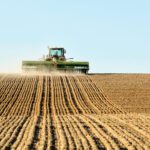Are you feeling it? The shift in purchasing power. The drive for transparency. The growing passion for food’s journey. While it’s true that climate change and politics are often intertwined, such as with climate-smart grants, the driving force behind U.S. companies adopting sustainable practices isn’t being driven by government policies alone.
For over a decade, consumer preferences have played a significant role in shaping sustainability initiatives. Today’s shoppers are increasingly demanding about the environmental and social impacts of how their food is grown or how services are delivered.
How Voluntary Initiatives Can Create Opportunities for Farmers
Sustainability has become a priority for younger generations, who are set to dominate purchasing power in the U.S.
It’s worth noting that these sustainability efforts are entirely voluntary and driven by consumer demand rather than government mandates. This creates opportunities for farmers to embrace climate-smart practices with confidence in the growing market for sustainable products.
What are consumers asking for?
According to the Harvard Business Review, “Companies that understand these trends, and create truly sustainable brands that make good on their promises to people and the planet, will seize advantage from brands that make flimsy claims or have not invested sufficiently in sustainability.”
What’s the pay-off for growers and suppliers?
Data from McKinsey & Company supports this, showing that products with environmental, social, and governance-related claims experienced 28% cumulative growth from 2018 to 2022, compared to 20% for products without such claims.
The Benefits for Producers
This rising demand for transparency and interest in how food is produced will continue to fuel the market for sustainable products.
For farmers, adopting sustainability practices will provide more than just environmental benefits or access to supply-chain premiums. They can deliver significant on-farm advantages. These include healthier soil, improved water quality and availability, reduced operating costs, and increased productivity.
Producers should take note of how they, too, can create their own measurable stories — whether it’s earning premiums for low-emission grain or selling carbon offsets generated on their farms.
Exploring Sustainability Initiatives at the Farm Level
While these practices require time, learning, and adjustments, there are clear, measurable examples of the benefits of climate-smart practices are helping to highlight how they outperform less sustainable methods.
Enlist the help of a professional sustainability advisor to evaluate and secure new opportunities in areas like sustainability program development and reporting, GHG strategy, and land conservation and nutrient management.
Pinion’s sustainability team helps farmers, growers, and ranchers to secure new opportunities from conservation efforts, carbon programs, sustainability programs, and conservation management. Reach out to a Pinion sustainability advisor to evaluate potential opportunities for your operation.







